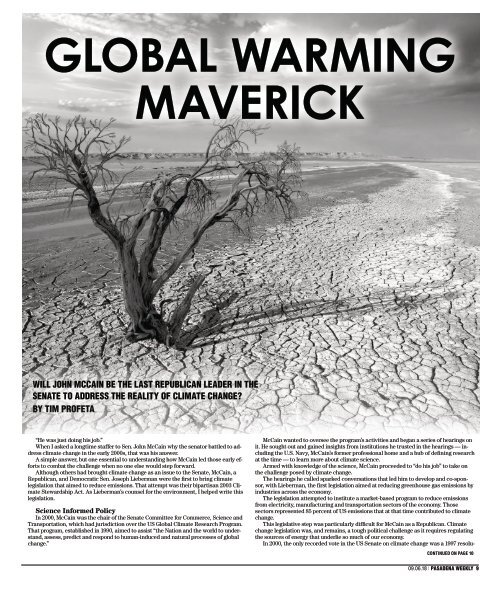09.06.18
You also want an ePaper? Increase the reach of your titles
YUMPU automatically turns print PDFs into web optimized ePapers that Google loves.
GLOBAL WARMING<br />
MAVERICK<br />
WILL JOHN MCCAIN BE THE LAST REPUBLICAN LEADER IN THE<br />
SENATE TO ADDRESS THE REALITY OF CLIMATE CHANGE?<br />
BY TIM PROFETA<br />
“He was just doing his job.”<br />
When I asked a longtime staffer to Sen. John McCain why the senator battled to address<br />
climate change in the early 2000s, that was his answer.<br />
A simple answer, but one essential to understanding how McCain led those early efforts<br />
to combat the challenge when no one else would step forward.<br />
Although others had brought climate change as an issue to the Senate, McCain, a<br />
Republican, and Democratic Sen. Joseph Lieberman were the first to bring climate<br />
legislation that aimed to reduce emissions. That attempt was their bipartisan 2003 Climate<br />
Stewardship Act. As Lieberman’s counsel for the environment, I helped write this<br />
legislation.<br />
Science Informed Policy<br />
In 2000, McCain was the chair of the Senate Committee for Commerce, Science and<br />
Transportation, which had jurisdiction over the US Global Climate Research Program.<br />
That program, established in 1990, aimed to assist “the Nation and the world to understand,<br />
assess, predict and respond to human-induced and natural processes of global<br />
change.”<br />
McCain wanted to oversee the program’s activities and began a series of hearings on<br />
it. He sought out and gained insights from institutions he trusted in the hearings — including<br />
the U.S. Navy, McCain’s former professional home and a hub of defining research<br />
at the time — to learn more about climate science.<br />
Armed with knowledge of the science, McCain proceeded to “do his job” to take on<br />
the challenge posed by climate change.<br />
The hearings he called sparked conversations that led him to develop and co-sponsor,<br />
with Lieberman, the first legislation aimed at reducing greenhouse gas emissions by<br />
industries across the economy.<br />
The legislation attempted to institute a market-based program to reduce emissions<br />
from electricity, manufacturing and transportation sectors of the economy. Those<br />
sectors represented 85 percent of US emissions that at that time contributed to climate<br />
change.<br />
This legislative step was particularly difficult for McCain as a Republican. Climate<br />
change legislation was, and remains, a tough political challenge as it requires regulating<br />
the sources of energy that underlie so much of our economy.<br />
In 2000, the only recorded vote in the US Senate on climate change was a 1997 resolu-<br />
CONTINUED ON PAGE 10<br />
<strong>09.06.18</strong> | PASADENA WEEKLY 9

















